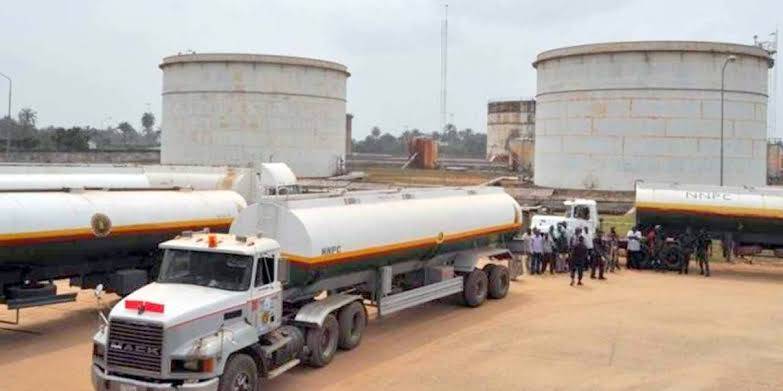Petroleum Marketers Threaten Shutdown Over Unpaid N100 Billion Bridging
The Independent Petroleum Marketers Association of Nigeria (IPMAN) has issued a strong warning that its members may suspend operations if the Nigerian Midstream and Downstream Petroleum Regulatory Authority (NMDPRA) fails to settle outstanding bridging claims amounting to N100 billion.
Abdul Ibrahim, Chairman of IPMAN’s Gombe depot, made this known during a press conference in Abuja. He expressed frustration over the prolonged delay in payments, which has severely impacted business operations and led to financial hardships for marketers.
According to Ibrahim, it has been over a year since IPMAN first demanded the payment, yet the NMDPRA has remained unresponsive. He pointed out that members of the Nigerian Association of Road Transport Owners (NARTO) had also highlighted the same issue during their negotiations before calling off a strike.
“NMDPRA assured us that the payments would be made within 40 days, but months have passed without any action. This has led to the shutdown of several depots in the northern region, including those in Jos, Gusau, Suleja, Kaduna, Kano, Gombe, Yola, and Maiduguri,†Ibrahim stated.
He explained that the funds in question were deducted from marketers at the point of product purchase as part of the bridging allowance, intended to cover transportation costs for fuel distribution across the country. However, the continued withholding of these payments has left many marketers in dire financial straits.
Devastating Consequences for Marketers
The IPMAN chairman revealed that the prolonged debt has led to significant losses within the industry. Many marketers have lost their businesses as banks seize their properties over unpaid loans. Additionally, some members have died due to the financial stress caused by the unpaid claims, while numerous employees have lost their jobs.
“These difficulties are a direct result of NMDPRA’s refusal to release our funds. We have exhausted all means of negotiation and patience,†Ibrahim emphasized.
This situation has affected not only independent marketers but also the entire fuel supply chain. Many marketers have been forced to shut down operations, leading to disruptions in petroleum product availability. The longer this issue remains unresolved, the more severe the economic consequences will be for businesses and consumers alike.
The Role of Bridging Claims in Fuel Distribution
Bridging claims are an essential mechanism in Nigeria’s fuel distribution network. Since petroleum products are often transported over long distances from coastal depots to inland states, the bridging fund ensures that marketers are reimbursed for transportation costs. This system was designed to prevent fuel scarcity in remote areas and keep prices uniform across the country.
However, the failure to pay these claims threatens the entire distribution structure. If marketers withdraw their services due to financial constraints, many regions could experience severe fuel shortages. The effects could be particularly harsh in northern states that rely heavily on bridging arrangements to receive regular fuel supplies.
Final Ultimatum and Threat of Nationwide Disruption
IPMAN has now given the NMDPRA a seven-day ultimatum to settle the outstanding payments. If the government fails to act, the association plans to collaborate with other key industry players, including the Petroleum Tanker Drivers (PTD) and NARTO, to initiate collective action.
“As IPMAN members, we own a significant number of the petroleum tankers operating in the country. If our demands are not met, we may be forced to withdraw these tankers from fuel distribution,†Ibrahim warned.
This move could result in severe fuel shortages across Nigeria, as independent marketers play a crucial role in supplying petroleum products nationwide. If their tankers are pulled from operation, major cities and rural areas alike could experience long queues at fuel stations, skyrocketing prices, and disruptions in essential services that rely on fuel.
Beyond the issue of unpaid bridging claims, Ibrahim also accused NMDPRA of imposing multiple irregular and burdensome levies on petroleum marketers.
“NMDPRA has introduced exorbitant fees whenever we attempt to renovate our filling stations. These levies are arbitrary, anti-developmental, and unconstitutional. We demand their immediate suspension,†he stated.
According to him, the regulatory agency’s increasing financial demands on marketers have made it even more difficult for businesses to survive in an already challenging economic environment. Many marketers are struggling to maintain operations as a result of these policies, which they see as punitive and counterproductive.
The potential shutdown of operations by independent petroleum marketers could have far-reaching economic effects. Nigeria’s fuel supply chain is heavily dependent on independent marketers, who distribute a significant portion of the country’s petroleum products. If these marketers withdraw their services, it could lead to fuel shortages, transportation disruptions, and increased costs for businesses and consumers.


